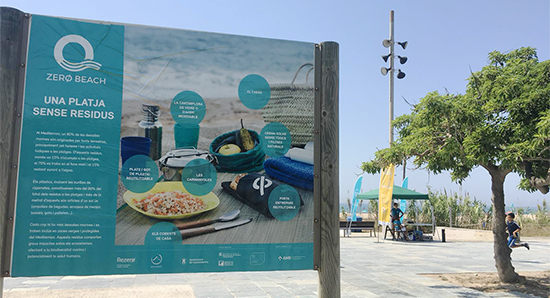
80% of marine litter in the Mediterranean comes from land-based sources and 80% of it is plastic. An average daily contribution of 250,000 pieces of waste per square kilometre is estimated during the tourist season on the beaches.
The Zero Beach project, coordinated by Rezero and Eco-union, has shown that banning smoking on beaches can reduce the presence of cigarette butts in the sand by up to 80%.
A smoking ban and the limitation of disposable plastics in beach bars could be implemented immediately on Catalan beaches, avoiding a large amount of marine debris.
Beaches are one of the most crowded spaces during the summer on the Catalan and Mediterranean coast, with images of beaches full of debris (plastic, cigarette butts, etc.) being very frequent.
Alejandro González of Eco-union, emphasizes that sun and beach tourism is a very important environmental pressure factor, since it is responsible for a 40% increase in waste during the summer in the Mediterranean.
What would a zero-waste beach look like?
Rosa Garcia from Rezero explains that in this transition towards a zero waste society, the Zero Beach project involves different municipalities to find solutions and steps such as enjoying smoke-free spaces and reducing all disposable materials such as bottles, straws, cutlery , etc. which are the main types of plastics found in the seas and to promote deposit and return systems with incentives that notably prevent the abandonment of this waste.
Last summer, the first pilot tests of the project on three beaches in Prat de Llobregat, Gavà and Castelldefels, reduced the presence of cigarette ends by up to 80% and recovered over 900 drink containers during a week.
The promoting entities ask the public institutions to go beyond voluntary actions and create a new regulatory framework that provides the municipalities and the government with instruments and resources to take effective measures that guarantee the enjoyment of waste-free beaches.
The future Law on Prevention and Management of Waste and Efficient Use of Resources that is being debated this year, is an opportunity to implement measures which, on the one hand, limit placing disposable plastics on the market and, on the other hand, avoids plastic products, such as beverage containers, reaching the sea, through the implementation of a deposit and return system. It is time to make beaches smoke-free public spaces.